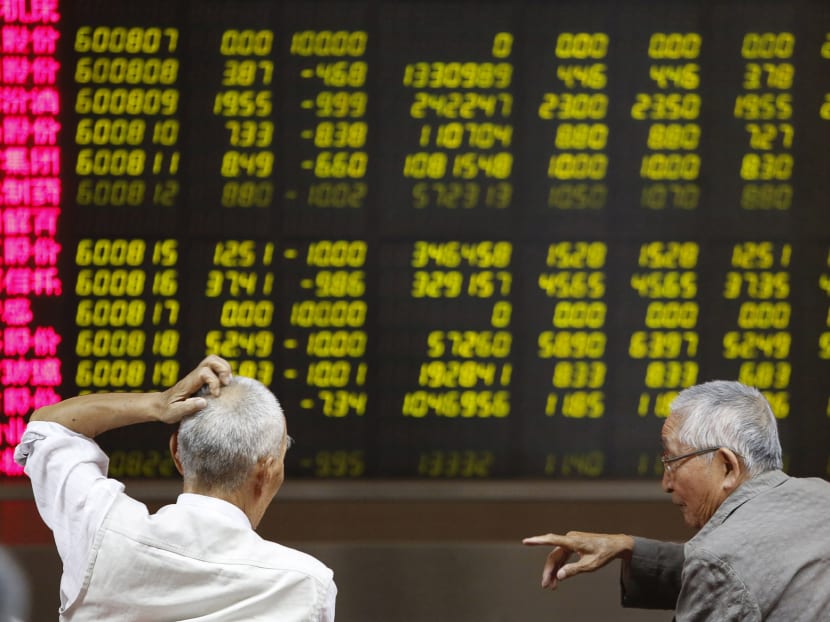Why our instincts make us poor investors
“You can take man out of the Stone Age, but you can’t take the Stone Age out of man.” This quote from the Harvard Business Review has become increasingly accurate in the nascent field of neuroeconomics, which combines the disciplines of neuroscience, psychology and economics to look at how economic decision-making takes place inside the brain.

Investors chat as they watch a board showing stock prices at a brokerage office in Beijing. Photo: Reuters
“You can take man out of the Stone Age, but you can’t take the Stone Age out of man.” This quote from the Harvard Business Review has become increasingly accurate in the nascent field of neuroeconomics, which combines the disciplines of neuroscience, psychology and economics to look at how economic decision-making takes place inside the brain.
Evolutionary psychology has revealed that our mind was designed by natural selection to solve adaptive problems faced by our hunter-gatherer ancestors. As such, our brains are quick to recognise short-term trends (predicting where food can be found) or generating quick reflexive emotional responses (escaping from predators). Unfortunately, these same responses can cause our downfall when we think about money and investing.
Research by Dr Jordan Grafman at Northwestern University and Dr Hans Breiter at Harvard showed that by telling people they were losing or expected to lose money, this triggered the section of the brain that is thought to process emotions, namely fear. Hence their fight or flight response. If this caused you to dive into a pond to escape a swarm of bees, this response could save your life.
But in the investing world, dumping your stocks in panic and “running to safety” when the markets fall could act against you. This typically happens when the pain of loss becomes too great, which is usually at market lows, causing investors to miss out when the market bounces back.
The release of adrenaline, which is known to consolidate our memories of fear and anxiety, also makes you likely to vividly recall emotionally-stressful events like a market collapse and your investment losses. This tends to crowd out your purpose for investing which you established in calmer moments. Market reaction during boom and bust cycles are similar – market crashes are usually swift and sudden, but the recovery period is much slower, as investors have been scarred and therefore hesitant to participate in the recovery.
Our brains are also wired to search for patterns to try and predict outcomes. If you present a random series of numbers, faces or letters, most people will claim they can predict the next item in that series. For example, thinking that we are due to hit our jackpot in TOTO after a few close shaves, although the probability is still one in 14 million.
That’s why technical analysts vehemently insist that charts of past stock prices can predict the path of future market returns, and why every market strategist is sure he can forecast the price of gold, technology or healthcare, just by studying past patterns.
Dr Scott Huettel of Duke University discovered that our brains are wired to anticipate repetition even if a stimulus occurs only twice in a row. The feeling of “I know what’s coming next” kicks in, and we automatically assume reiterations. The longer the pattern repeats, the more violently our brains respond once that pattern is broken.
In an investing context, the moment growth companies start to falter after consecutive quarters of good earnings, investors start jumping ship – causing big movements in share prices. Also, we get lulled into a sense of comfort when stock markets slowly grind upwards over a long period. However, when stock prices then start to decline, our brains react strongly to this broken pattern. Coupled with the panic trigger and accompanying adrenaline rush, this causes an immediate emotional reaction without allowing the analytical part of the brain to respond.
Pattern recognition also helps explain why value stocks are consistently underpriced. Earnings from these companies are usually lumpier and are not consistent. Our brains find this unpredictability hard to grasp, and as a result, investors struggle to price these stocks accurately.
As humans, we also love taking chances. The chance that the stock you bought could go up 100 per cent or that your Singapore Sweep ticket could strike S$2 million is what keeps us coming back for more.
A study by Dr Wolfram Schultz at the University of Cambridge showed that the possibility of getting a reward releases dopamine in the brain, producing a “high”. That’s why we defy logic and poor odds to continue buying the lottery, investing in initial public offerings, picking stocks and shunning “average” market returns.
The possibility of being the next Warren Buffet or buying the next Facebook helps keep our wallets open. The anticipation of the next big win is addictive, stimulating the same part of the brain that causes cravings in cocaine addicts.
So, how do you use these insights to make you a better investor?
First, recognise that we will never be able to change how our brains work. Instead of trying to give up your habit of betting on the next hot tip, use a different (and smaller) wallet to limit any losses. Or establish a dollar-cost averaging plan that automatically buys into a globally diversified portfolio every month, rain or shine.
Second, cut out as many destructive triggers as possible. For example, stop watching stock tickers, CNBC, Bloomberg or anything that might invoke investing panic.
Finally, meet regularly with a trusted friend or financial adviser who can help stave off panic fears and keep you grounded as to the financial goal you are seeking to achieve.
ABOUT THE AUTHOR: Aw Choon Hui is the deputy CEO of GYC Financial Advisory, a licensed financial adviser and registered fund management company.





